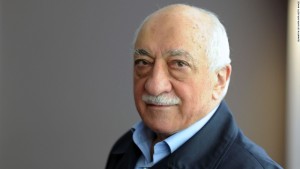Sometimes history hides its best secrets in plain sight. Over the past few years I have come into contact with the work of Fetullah Gulen and his followers, but only little by little understood how crucial this man and his teaching may be to the future of religion in our contemporary world. The Turkish Islamic scholar is significant for Islam in particular, but also for religion broadly, especially that of the Abrahamic traditions—Islam, Christianity, Judaism, whose members together comprise half the planet.

Gulen belongs to a revival of Islam in Turkey which, in turn, forms part of the nation’s long history as the crossroads where the Asian peninsula bumps into Europe, a country where strands and layers of culture, east and west, meet, clash and mesh. Turkey was the home of Rumi, the mystic and poet whose name means “Roman” in Arabic and who is beloved of Muslim, Christians and non-believers alike. After the First World War the Ottoman regime, which had ruled Turkey for six centuries, collapsed and a nationalist secular government took its place. The new “Kemalist” politicians legislated against the public influence of Islam, seeking to bring Turkey up to speed with the Western nations which had, as they saw it, established an enlightened critical distance from religion.
Licensed Islamic religion and practice were still permitted in Turkey and Gulen became a government-recognized assistant imam as a teenager in 1958. But both Turkey and Gulen have spiritual energies which expand far beyond narrowly imposed constructs, and social unrest in the former and desire for religious reform in the latter continued to affect the landscape dramatically and progressively. I am not enough an expert in Turkish history to be able to summarize the turmoil in Turkish politics through the sixties all the way to the 2000s, but there were three coup d’etats in this period.
The military seem continually ready at the back door of the state apparatus to break their way in and impose physical order. The key point, however, is that against this background Gulen has continually advocated for tolerance and forgiveness, consistent with an ethic of service rather than power. (See Christopher L. Miller and Tamer Balci, eds, The Gülen Hizmet Movement: Circumspect Activism in Faith-Based Reform, especially Tamer Balci, “Islam and Democracy in the Thought of Nursi and Gulen.”)
Gulen’s influence grew from the eighties onward. In 1976 he opened a students’ hostel offering scholarships for poorer scholars and hosting informal Quranic discussions. He called the place a “light house” (işık evler) and he invited others to follow the same model. The development of this practice became the genesis of the Gulen movement. My friend, Timur, experienced at first hand a center like this, as a teenager in his hometown in Turkey. He told me he would sleep on the floor overnight simply to soak up as much teaching and spirituality as possible. Social and political reforms in the period favored the growth of these educational centers and progressively the whole thing became a front-line cultural phenomenon. The impression is of a profound religious and cultural thirst which Gulen was able to respond to, despite the harsh opposition sometimes experienced by the students. Timur says he was beaten up in school by teachers, when they understood he was attending a Gulen center! But Gulen’s teaching was always a matter of nonviolent influence on civil society, not a theocratic movement taking over the state apparatus. His followers adopted the name Hizmet, which means service, emphasizing an attitude of self-giving rather the pursuit of power. This approach has been misunderstood and opposed both by the traditional secularists, who see it as yet another religious threat to their vision of society, and by hardline Islamists who see it as rolling over to the West and “pro-American.”
Into this already toxic mix we must also insert the current president of Turkey, Recep Erdogan, and his political party (Justice and Development, AKP). Gulen and Erdogan were initially allies, with Erdogan espousing an Islamic version of society and readily employing Hizmet people. The Hizmet movement offered the most prepared cadre of activists, able to staff schools, universities, the media, the judiciary etc., and they quickly rose to prominence. But fault-lines soon developed, and Erdogan conceived a bitter hatred for Gulen because he would not teach his followers to embrace the normal practice of power.
Erdogan rose to success with the return of Islamic religion to the public square, but he did not change his political philosophy from a standard worldly function of religion–used to undergird systems of manipulation and control. In contrast, Gulen and his followers did not want to promote yet another authoritarian, self-serving political apparatus. The 2013 corruption revelations in the Turkish government, including members of Erdgan’s own family, were broadcast by Hizmet media outlets and in some instances prosecuted by lawyers influenced by Gulen’s thought. Erdogan hit back by accusing Gulen of creating a “state within the state” and seeking to overthrow the government. With the upside-down thinking only contemporary media propaganda can effect, Erdogan has branded Gulen as a terrorist and enemy of Turkey, going on to accuse him of responsibility for the farcical but still tragic, failed coup attempt in 2016. Very few Western journalists believe Erdogan and his state-run media’s narrative, but, at the same time, the mere fact of its existence seems continually to put a question mark over the Hizmet phenomenon. Such a broad yet shadowy group must still have clandestine motives, especially if it is Islamic! This is where I think the principle of nonviolence is so crucial. There can be absolutely nothing wrong with wanting to influence and affect society for the better–on the contrary!–so long as violence is not employed as a motive or means. I have learned at first hand the negative consequences of Erdogan’s campaign in the dozens of Turkish men and women, disciples of Gulen, who have lost jobs in Turkey, been imprisoned and dare not return, and whose relatives are in danger simply because they are linked to them. At the same time, I have continually been impressed by the lack of hatred in these individuals, their willingness to endure, and their general response of non-retaliation. If I judge by Jesus’ principle of “by their fruits you shall know them,” then I have to believe in the authenticity of Fetullah Gulen and his teaching.
So where did this principle come from? Timur sent me a wonderful poem by a Sufi writer, Yunus Emre, entitled The Drop That Became The Sea.
It includes the following lines, and Timur told me that Gulen used the second stanza “thousands of times” in his sermons and books.
A dervish needs a wounded heart and eyes full of tears.
He needs to be as easy going as a sheep.
You can’t be a dervish.
He must be without hands when someone hits him.
He must be tongueless when cursed.
A dervish needs to be without any desire.
You can’t be a dervish.

You make a lot of sounds with your tongue, meaningful things.
You get angry about this and that.
You can’t be a dervish.
If it were all right to be angry on this path,
Muhammad himself would have gotten angry.
Because of your anger, you can’t be a dervish.
Gulen used this verse to engender nonviolence in his students. It was only later he understood this was already the teaching of Jesus. Timur also sent me a link to a recent sermon in which Gulen recognizes Jesus as the source of such instruction. The sermon is in Turkish but Timur translated the relevant portion. Gulen is talking about his revised version of a proverb. It is “‘If you worry that someone will hurt you, try to soften them with your kindness, offer your help.’” Then Gulen comments, “When I was making my own version of this proverb, I was not aware of the message of Master Blessed Messiah on this topic. Then I learned that (the) … Master of Compassion, Mercy, and Generosity says: ‘The real kindness is not returning a kindness, it is responding to unkind with kindness’. So, if someone is running to you with the intent to bite you like an animal, you should treat them like a human and disable their harm with kindness.’” (Timur confirms that “Master Blessed Messiah” is a common Islamic honorific for Jesus.)
Timur concludes with a quote from the Quran: “The good deed and the evil deed cannot be equal. Repel (the evil) with goodness and kindness (i.e. Allah ordered the faithful believers to be patient at the time of anger, and to excuse those who treat them badly), then verily! the one who tries to be your enemy could become a close friend.”
So, it becomes obvious that there’s a living, authentic strand of nonviolence in Islam, one which Gulen continues to distill and bring to prominence. But he also recognizes that it goes back scripturally to Jesus. Here is something of immense importance for Christians and Muslims to share together. And in this connection it is also worth pointing to an essential crux of concern between Islam and Christianity: the death of Jesus. There is a verse in the Quran (Q4:157) which seems to claim that Jesus did not in fact die on the cross. The interpretation of the verse is debated, but whatever the Quran verse does in fact intend Jesus’ death is obviously pivotal to any standard version of Christian faith practiced today. If, then, there is a breakthrough possibility for Muslims to see Jesus’ death as the Messiah’s own supreme witness of non-retaliation and forgiveness, so it becomes easier for interfaith dialogue to progress. We could also put it the other way round. If both religions—Islam and Christianity—begin to see nonviolence as the revelation of the character of God then it is not unreasonable to think God’s Messiah might indeed agree to suffer to the point of death in order to demonstrate exactly that truth. In any case, Gulen is a key teacher in the 21st century enabling both religions to know that this is truly the meaning of God and, therefore, the journey and destiny of all his believers.
.